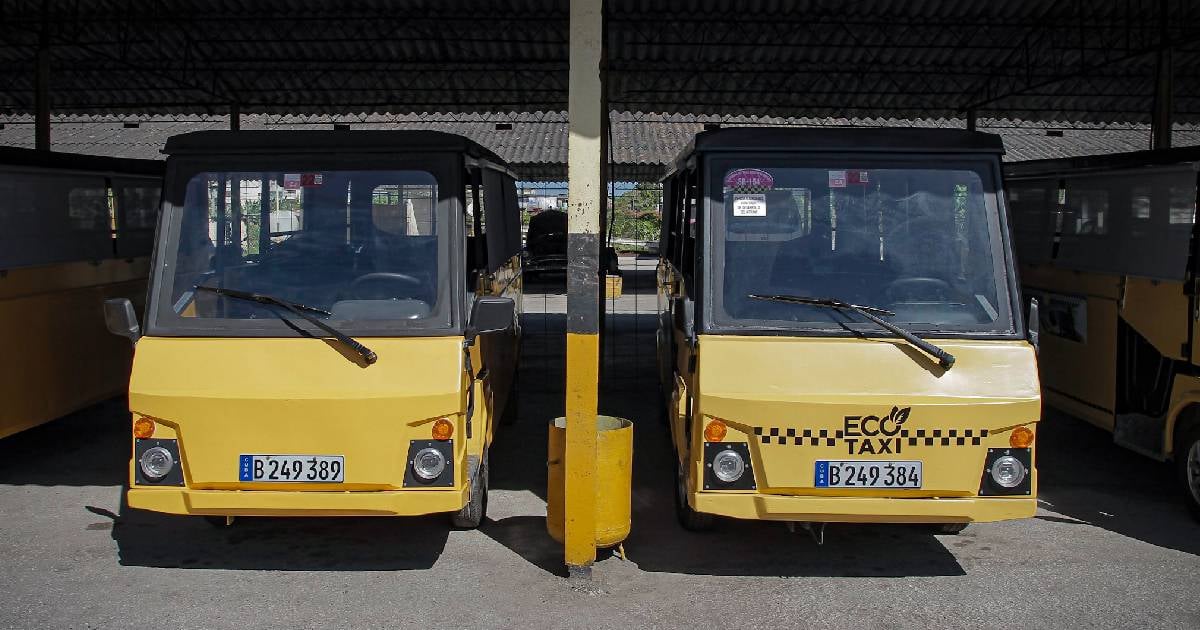In the midst of a severe national energy crisis, where daily blackouts plague the entire island, the Cuban government is pushing forward with an ambitious electric transport project in the province of Sancti Spíritus. As part of a pilot program for sustainable mobility, five "ecomobiles" are already on the roads.
According to a Facebook post by Transportation Minister Eduardo Rodríguez Dávila, the main municipality of Sancti Spíritus has been offering Ecotaxi services since late 2023. Operated by the Empresa Militar Industrial "Coronel Francisco Aguiar Rodríguez," this initiative aims to provide an eco-friendly alternative to the failing traditional transport system.
Electric Mobility Amidst Power Outages
The new electric vehicles are part of a broader initiative to manufacture 50 minibuses. Of these, 23 will soon be added to the fleet in Sancti Spíritus, with another 10 in Trinidad still under production. Ironically, this push for electric transport comes during a chronic deficit in power generation, with official reports indicating daily disruptions of over 1000 MW from the National Electric System (SEN). This raises serious doubts about the practical feasibility of these projects in the near term.
Service Details and Challenges
The service is planned to operate across four routes: three in Sancti Spíritus and one in Trinidad, with key stops including José Martí Pérez Pediatric Hospital and Camilo Cienfuegos Provincial Hospital. Each minibus can hold 11 passengers and is expected to complete up to 10 trips daily, potentially transporting around 120 people per vehicle, as explained by the minister.
The peak demand times, identified as 5:00 a.m. to 9:00 a.m. and 3:00 p.m. to 8:00 p.m., coincide with periods when power cuts are most frequent, potentially jeopardizing the service if a stable charging network is not available. Rodríguez Dávila mentioned that the fare would be 10 Cuban pesos, with routes ranging from 4 to 5 kilometers, making it an affordable option for the community.
Solar Charging and Future Sustainability
The project also involves installing solar-powered charging stations, aimed at reducing reliance on the national grid and ensuring operations continue during blackouts. Supported by the Public Transport Development Fund, financed by taxes on motor vehicle sales in the country, this initiative was officially presented at the 2023 International Transportation and Logistics Fair.
Between Efficiency and Symbolism
Despite not being a major contributor to global climate change, Cuba has consistently pledged to reduce emissions. This move towards electric transport aligns with that commitment, yet the real impact hinges on the country's ability to provide stable electricity and basic operational conditions—challenges exacerbated by a government plagued by poor decisions.
The immediate challenge is not just ecological or technological but also energy-related and structural. Public transport remains in shambles, and for many, mobility is still a luxury.
FAQs on Cuba's Electric Minibus Project
What is the goal of the electric minibus project in Cuba?
The project aims to provide an eco-friendly alternative to the traditional transport system by introducing electric minibuses, reducing reliance on fossil fuels amidst a failing energy infrastructure.
How will the electric minibuses be powered?
The minibuses will be powered by electricity, with plans to install solar-powered charging stations to reduce dependence on the national grid and maintain operations during blackouts.
What challenges does the project face?
The main challenges include ensuring a stable electricity supply for charging the vehicles, given the frequent power outages, and addressing the broader structural issues of Cuba's transport system.
